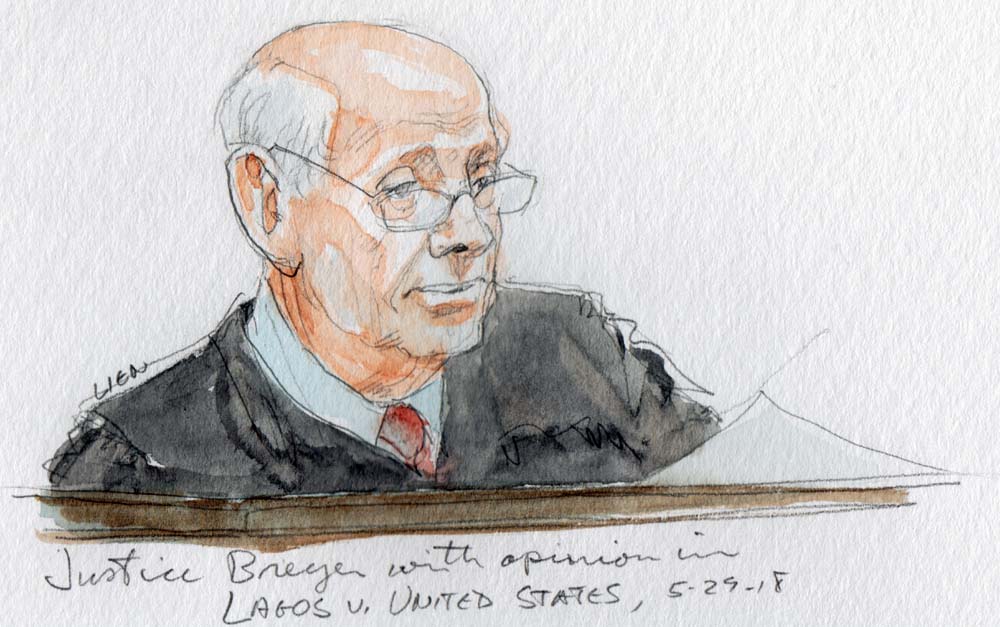Opinion analysis: Court adopts narrow reading of federal criminal restitution statute
on May 29, 2018 at 2:44 pm

One could easily miss this morning’s short, unanimous opinion by Justice Stephen Breyer in Lagos v. United States. But the impact of the decision is significant. This case marks a clear indication of the court’s willingness to read a federal criminal restitution statute narrowly, rather than in a manner that permits the continued expansion of circumstances in which criminal restitution can be ordered. Particularly noteworthy is the court’s recognition of the long odds against criminal restitution ever being paid, suggesting an acknowledgement that financial awards may be an ineffective remedy for victims when there is a largely indigent criminal-defendant population.
The Mandatory Victims Restitution Act requires courts to impose restitution for victims of a number of enumerated federal crimes. Under the MVRA, found at 18 U.S.C. § 3663A, the court must order a criminal defendant to “reimburse the victim for lost income and necessary child care, transportation, and other expenses incurred during participation in the investigation or prosecution of the offense or attendance at proceedings related to the offense.” At issue in this case is how to interpret that language.
Mostly, the court adopted the argument advanced by the petitioner, Sergio Lagos. Lagos offered a narrow reading of the statute, advocating that the MVRA should apply only to the investigation or prosecution of a federal criminal offense, and only to reimbursement of incidental, out-of-pocket expenses incurred during that federal criminal investigation and prosecution. Thus, any expenses a victim incurs in a private investigation, such as an internal corporate investigation, or as part of a parallel civil proceeding, like a bankruptcy, SEC, or family court proceeding, are not covered by the MVRA.
The court agreed with Lagos that the words “‘investigations’ and ‘proceedings’ are limited to government investigations and criminal proceedings.” The court’s primary analysis was textual, based on how the words of the statutory provision fit together and what seems to make the most sense when looking at the sentence as a whole. While acknowledging that “the individual words suggest (though they do not demand) our limited interpretation,” Breyer also cited to a significant practical factor in support of the court’s decision: “A broad reading would create significant administrative burdens.” If the statute were read broadly, lower courts would be left trying to determine whether a particular cost was “necessary” to the private investigation or related civil proceeding, and what type of “proceeding” is sufficiently “related to the offense” to make those expenses eligible for reimbursement as restitution. Not insignificantly, this type of fact-intensive and time-consuming analysis would be for little gain, Breyer pointed out, as “few victims are likely to benefit because more than 90% of criminal restitution is never collected.”
In its brief and at oral argument, the government raised the concern that a narrow interpretation of the MVRA’s language would, as Breyer put it, “sometimes leave a victim without a restitution remedy sufficient to cover some expenses (say, those related to his private investigation) which he undoubtedly incurred as a result of the offense.” As predicted in my argument analysis, the presence of a civil remedy alleviated some of the court’s concerns about leaving a victim uncompensated. As the court noted, the corporate victim in this case, General Electric Capital Corporation, brought a civil lawsuit against Lagos seeking reimbursement for these same expenditures and obtained a more than $30-million judgment in that case. However, the court observed that, according to the government, GE “has largely been unable to collect on that judgment,” and “there is no reason to think that collection efforts related to criminal restitution would prove any more successful.”
The government also consistently cited to the general purpose of this criminal restitution statute: “to ensure that victims of a crime receive full restitution.” Significantly, the court observed that “a broad general purpose of this kind does not always require us to interpret a restitution statute in a way that favors an award.” The court noted the different language in each of the federal criminal restitution statutes, and pointed out that Congress could have drafted the MVRA differently, had it desired broader compensation under the circumstances outlined in the statute.
Finally, the court turned to an issue addressed by each of the parties: what the government’s role in the investigation must be in order for a court to order restitution under the MVRA. The government argued that because the prosecution used the information gathered pursuant to the private investigation in this case, those expenses were part of the “investigation” as defined by the MVRA. The court swiftly rejected this argument, citing to the statutory language requiring that the expenses be incurred “during participation in the investigation or prosecution of the offense.” Agreeing with Lagos, the court declined to expand the statute’s reach to “preparticipation” expenses incurred “before the victim’s participation in a government’s investigation began.”
Although Lagos prevailed, the court was unwilling to go as far as he wished on several points. First, in Lagos’ case, a private corporation undertook the investigation of its own volition, before the prosecutor’s investigation began. The court declined to address the further issue of whether expenses incurred during a private investigation “pursued at a government’s invitation or request” would be similarly excluded from coverage under the MVRA. The court also did not explicitly address Lagos’ claim that the MVRA does not cover state government investigation expenses. The court’s articulation that “investigations” means “government investigations” suggests that state prosecutions also would be covered, but the court declined to say that. Likewise, the hot-button issue of reimbursement of attorney’s fees, addressed by both parties and amicus counsel in their briefs, did not appear in the opinion, because the court’s textual interpretation precluded the question. On these facts, the attorney’s fees were incurred as part of an independent preparticipation investigation, not pursuant to the government’s invitation or request after the prosecution’s own investigation began.
Despite the opinion’s heavy reliance on the text, the result in this case seems to be based as much on practicality – concerns about adding to the administrative burdens of lower courts and the massive amount of unpaid criminal-justice debt – as on statutory interpretation. But the court’s acknowledgment of the ineffectiveness of criminal restitution in actually providing monetary relief to crime victims is an important one, and may have lasting effects in other cases related to the payment of criminal fines and fees.



